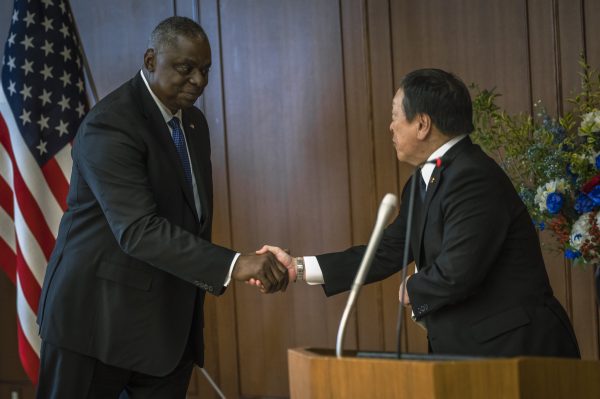
The defense chiefs of Japan and the United States have confirmed that the two nations will take all possible measures against North Korea’s missiles.
Japanese Defense Minister Hamada Yasukazu held talks in Tokyo on June 1 with U.S. Defense Secretary Lloyd Austin, who is visiting Japan on the way to the annual Shangri-La Dialogue Asian security summit in Singapore on June 2-4.
In a joint press conference after the meeting, Hamada condemned North Korea’s failed ballistic missile launch on May 31, which Pyongyang claims was meant to put a military satellite into orbit.
Hamada said that Japan and the United States, and the two nations plus South Korea, will act in concert against North Korea’s provocative actions, underscoring the need for full-fledged warning and surveillance activities to deal with further missile launches by Pyongyang.
Austin said that North Korea’s nuclear and missile programs pose a threat to regional peace and stability and that the United States will take all possible measures to defend its allies.
In a rare move, immediately after its spy satellite launch on May 31, North Korea acknowledged the failure and announced it will relaunch the “military reconnaissance satellite” as quickly as possible.
“It is certain that the DPRK’s military reconnaissance satellite will be correctly put on space orbit in the near future and start its mission,” North Korean leader Kim Jong Un’s younger sister Kim Yo Jong said in her statement on June 1, without providing further details of when another launch might take place.
After the trilateral summit held in Phnom Penh, Cambodia, in November last year, Japan, the United States, and South Korea agreed to share missile warning information in real time in order to enhance each nation’s ability to detect North Korean missile launches.
This real-time information sharing about North Korean missiles will build on the framework of the Trilateral Intelligence Sharing Arrangement (TISA) signed in 2014 by Japan, the United States, and South Korea. Based on this agreement, the defense authorities of the three nations may voluntarily share classified information, according to the Pentagon.
As symbolized by the strengthening of defense cooperation between Tokyo, Washington, and South Korea, the security framework in Asia is now approaching a critical turning point.
Under the conventional security framework, the United States cooperates with its allies individually: not only Japan and South Korea, but also Australia, Thailand and the Philippines. This is called the “hub and spoke” model, likened to the wheels of a bicycle. As Japan moves to strengthen cooperation with South Korea, “spoke-to-spoke” links will also be constructed, although Japan and South Korea are not military allies. The Philippines is also strengthening ties with Japan and Australia, adding another “spoke-to-spoke” layer to this region.
China was also a major topic of discussion at the Japan-U.S. defense ministerial meeting. In the joint press conference after his meeting with Hamada, Austin called it unfortunate that his Chinese counterpart refused to meet him at the annual security conference in Singapore, which both men are attending.
“The provocative intercepts of our aircraft and also our allies’ aircraft, that’s very concerning, and we would hope that they would alter their action,” Austin said.
The United States military said Tuesday that a Chinese J-16 fighter jet flew aggressively too close to a U.S. Air Force RC-135 in international airspace over the South China Sea, forcing the U.S. pilot to fly through the turbulent wake.
“I’m concerned about at some point having an incident that could very, very quickly spiral out of control,” Austin said. “I would welcome any opportunity to engage with [China’s] leadership. I think defense departments should be talking to each other on a routine basis or should have open channels for communication.”
Beijing has said no meeting will be forthcoming between Chinese Defense Minister General Li Shangfu and Austin, including at the security summit in Singapore, as long as Li remains under U.S. sanctions. The sanctions on Li were imposed in 2018 under the previous administration in response to Chinese purchases of Russian arms.
Meanwhile, Hamada is expected to meet with Li on the sidelines of the Shangri-La Dialogue. For this reason, it is widely believed that Hamada and Austin confirmed and coordinated their response to China in Tokyo. This is because traditionally Beijing desires to drive a wedge between Tokyo and the U.S. and lure Japan into its own side as much as possible.
On May 16, Hamada and Li held the first call using a dedicated “hotline.” They confirmed that this communication system plays an important role in building confidence between the two countries and avoiding unforeseen circumstances.
Japan, US Pledge to Take All Possible Measures Against North Korea’s Missiles
Source: Frappler

0 Comments